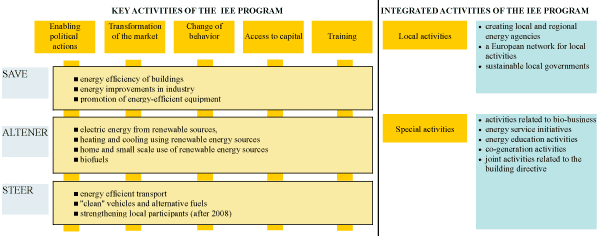|
Infrastruktura - Środowisko - Energia
Dodatek lobbingowy do "RZECZPOSPOLITEJ".
19 grudnia 2007 r.
po polsku
 
The Intelligent Energy Europe Program
Professor Tadeusz Skoczkowski - the President of the National Energy Conservation Agency (KAPE S.A.),
Antonina Kaniszewska, MS, Eng., the National Contact Point for the IEE program, KAPE S.A.
The European Commission has chosen the future of the energy sector of the Community by defining the energy we will be using as ''sustainable, competitive, and safe.'' This plan requires the most important thing - a change in the way we think about energy, and the way it is obtained and used. The program Intelligent Energy Europe is a tool that the European Union is using to achieve this goal.
The name of the program is easy to decipher: energy in Europe must be produced and consumed in an intelligent way. We must learn to take advantage of the huge available amounts of renewable energy and do everything to limit energy losses.
The program Intelligent Energy Europe 2007 - 2013 is a continuation of the program Intelligent Energy Europe 2003 - 2006.
The new thing in the program is that in 2007 the IEE Program was included in the Competitiveness and Innovation Framework Program 2007 - 2013 (CIP), which serves the purpose of achieving goals set by the new Lisbon Strategy.
The Competitiveness and Innovation Framework Program serves the purpose of increasing competitiveness of companies (especially small and medium companies SMC), promoting all forms of innovation (including eco-innovation), accelerating the creation of a durable, competitive, and innovative information-based society of integrating nature, and promoting energy efficiency and renewable energy sources in all sectors of the economy.
The following programs are included in the CIP program:
-
Entrepreneurship and Innovation Program,
- Information Communication Technologies Policy support Program (ICT PSP),
- Intelligent Energy Europe.
The total budget of the IEE program for 2007 - 2013 is 727 million euro.
The IEE program consists of three sub-programs whose main goals are:
-
fostering energy efficiency and the rational use of energy sources (SAVE),
- promoting new and renewable energy sources and energy diversification (ALTENER),
- promoting energy efficiency and new energy sources in transport (STEER).
Integrated activities involving various instruments, tools, and entities are also intended to be a part of the program.
The IEE provides co-financing of projects that serve the purpose of promoting and popularizing activities related to renewable energy sources and energy efficiency, and projects that popularize the best technologies, processes, products, and practices in these two areas. The IEE program is not an investment program, even though the European Commission is planning to implement the so-called replication projects which may include financing projects of significant promotional value.
The activities initiated in the program can be divided into topic areas such as: construction, industry, consumer products, renewable energy sources, heating and cooling, and biofuels. The basic key activities are listed in the table.

The IEE program involves activities in five intervention areas: enabling political actions, transforming of the market, changing the behavior, providing access to capital, and training. All those areas are intended to foster the construction of a sustainable energy system.
As a part of of the above-mentioned actions, the European Commission publishes the IEE Annual Work Program which defines the priorities, the budget, the principles of operation, the selection criteria, and the procedures in force in a given year. There is also a yearly call for proposals and a call for tenders concerning projects procured by the European Commission.
The next call for proposals is planned for February 2008. The budget for financing the proposals is approximately 50 million euro.
The European Information Day on the next contest will be held in Brussels on 31 January 2008, during the second European Union Sustainable Energy Week. The National Information Days are planned for March 2008.
The program supports only Europe - wide projects which directly contribute to the completion of the program's goals and the can be used in the whole Community, as well as national project related to the creation of local and regional energy agencies.
The IEE Program funding covers 75% of eligible project cost and 60% of indirect cost (this refers to direct personnel cost).
The following principles guide the financing of projects in the IEE Program:
-
the projects have to be based on international cooperation (a consortium of at least 3 partner organizations from 3 different eligible countries),
- there is no funding for one-time actions performed on the local level and without a clear element of cooperation; instead, funding is provided to actions performed in cooperation which bring results in the whole European Union,
- due to its nature as a non-technological program, it is aimed to remove non-technological barriers and to stimulate the growth of the EU market,
- the program does not finance hardware - type investments or research projects,
- the project to be funded cannot be longer than 3 years,
- funding is available to private and public legal persons; natural persons can be project partners.
In the case of creation of a local or regional energy agency, the financing principles are very similar, although the rule is: ''one application - one agency.'' Applications are submitted by local or regional public authorities. Agencies conclude financing contracts for 36 months and take the obligation to conduct their activities for another 5 years after the end of the 3-year financing period. The maximum financing is 75% but no more than 250 thousand euro.
More information on the IEE Program and examples of projects can be found at http://ec.europa.eu/energy/intelligent/index_en.html, at the Polish CIP Program web site run by the Polish Agency for Enterprise Development www.cip.gov.pl, or at the National Contact Point of the National Energy Conservation Agency.
Contact:
National Contact Point of the Intelligent Energy Europe Program
www.cip.gov.pl
Article financed by
the Ministry of Economy

National Energy Conservation Agency
00-560 Warszawa, ul. Mokotowska 35
tel. (22) 626-09-10
fax (22) 626-09-11
www.kape.gov.pl
|

